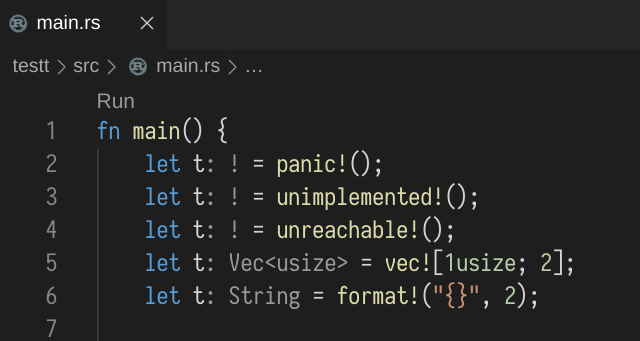We need to be more careful now when substituting bound variables (previously, we
didn't have anything that used bound variables except Chalk, so it was not a
problem).
This is obviously quite ad-hoc; Chalk has more infrastructure for handling this
in a principled way, which we maybe should adopt.
1928: Support `#[cfg(..)]` r=matklad a=oxalica
This PR implement `#[cfg(..)]` conditional compilation. It read default cfg options from `rustc --print cfg` with also hard-coded `test` and `debug_assertion` enabled.
Front-end settings are **not** included in this PR.
There is also a known issue that inner control attributes are totally ignored. I think it is **not** a part of `cfg` and create a separated issue for it. #1949Fixes#1920
Related: #1073
Co-authored-by: uHOOCCOOHu <hooccooh1896@gmail.com>
Co-authored-by: oxalica <oxalicc@pm.me>
1815: Support correct `$crate` expansion in macros r=uHOOCCOOHu a=uHOOCCOOHu
This PR makes normal use cases of `$crate` from macros work as expected.
It makes more macros from `std` work. Type inference works well with `panic`, `unimplemented`, `format`, and maybe more.
Sadly that `vec![1, 2, 3]` still not works, but it is not longer an issue about macro.
Screenshot:

Co-authored-by: uHOOCCOOHu <hooccooh1896@gmail.com>
This is only allowed for generic parameters (including `Self` in traits), and
special care needs to be taken to not run into cycles while resolving it,
because we use the where clauses of the generic parameter to find candidates for
the trait containing the associated type, but the where clauses may themselves
contain instances of short-hand associated types.
In some cases this is even fine, e.g. we might have `T: Trait<U::Item>, U:
Iterator`. If there is a cycle, we'll currently panic, which isn't great, but
better than overflowing the stack...
E.g. `fn foo<T: Iterator>() -> T::Item`. It seems that rustc does this only for
type parameters and only based on their bounds, so we also only consider traits
from bounds.